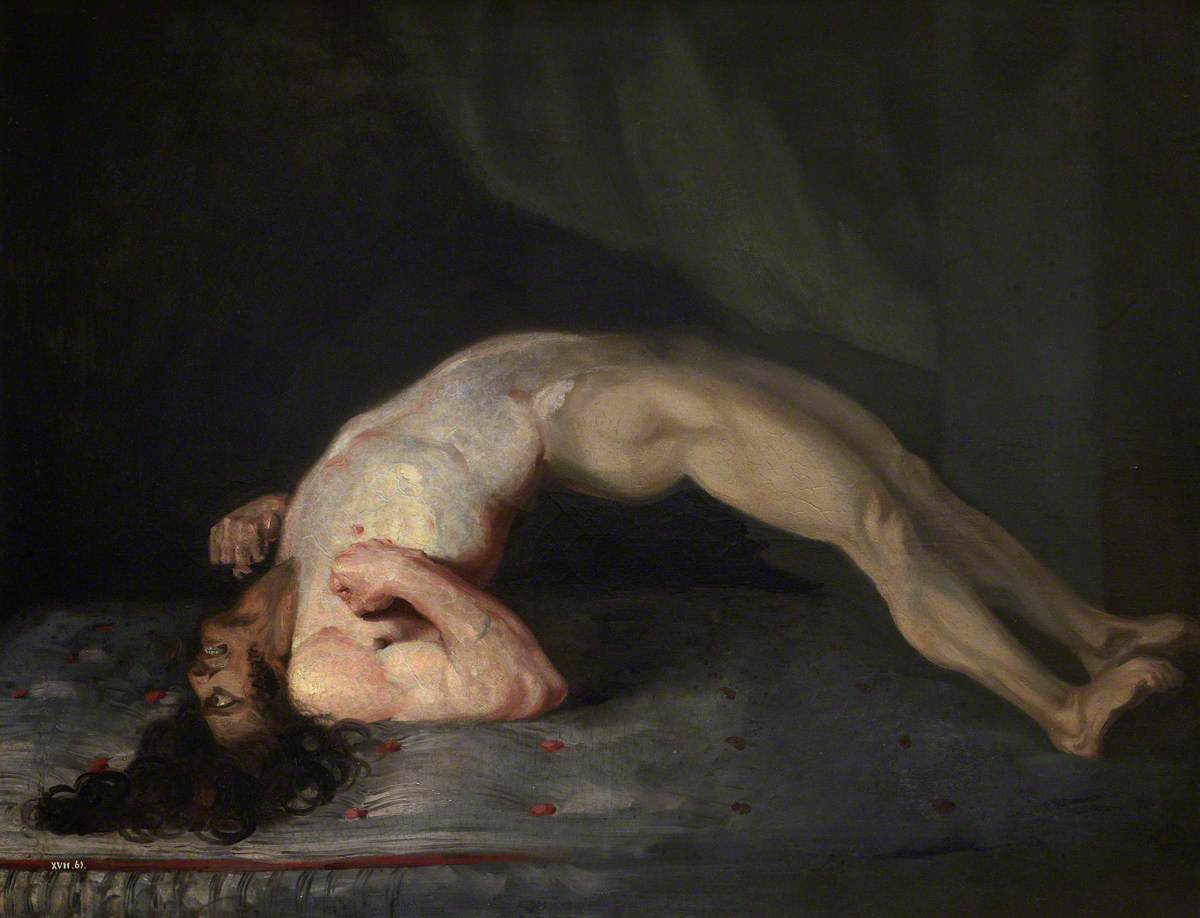Opisthotonus

Editor-In-Chief: Prab R Tumpati, MD
Obesity, Sleep & Internal medicine
Founder, WikiMD Wellnesspedia &
W8MD's medical weight loss NYC, sleep center NYC
Philadelphia medical weight loss and Philadelphia sleep clinics
| Opisthotonus | |
|---|---|

| |
| Synonyms | N/A |
| Pronounce | N/A |
| Specialty | N/A |
| Symptoms | Severe muscle spasms, hyperextension of the back |
| Complications | Respiratory failure, aspiration pneumonia |
| Onset | Sudden |
| Duration | Variable |
| Types | N/A |
| Causes | Tetanus, meningitis, severe head injury, cerebral palsy |
| Risks | Infection, trauma |
| Diagnosis | Clinical evaluation, neurological examination |
| Differential diagnosis | Seizure disorder, dystonia, decerebrate posture |
| Prevention | N/A |
| Treatment | Muscle relaxants, sedation, antibiotics for infection |
| Medication | Diazepam, baclofen, dantrolene |
| Prognosis | Depends on underlying cause |
| Frequency | Rare |
| Deaths | N/A |
Opisthotonus or opisthotonos (from Ancient Greek: ὄπισθεν opisthen, meaning 'behind', and τόνος tonos, meaning 'tension') is a neurological condition characterized by extreme hyperextension and spasticity. In this state, an individual's head, neck, and spinal column enter into a pronounced arching or bridging position.
Causes[edit]
Opisthotonus can be caused by a variety of conditions, including:
- Meningitis
- Severe brain or spinal cord injuries
- Tetanus
- Neuroleptic malignant syndrome
- Certain metabolic disorders
Symptoms[edit]
The primary symptom of opisthotonus is the extreme backward arching of the head, neck, and spine. Other symptoms may include:
- Muscle stiffness and spasms
- Difficulty breathing
- Pain
Diagnosis[edit]
Diagnosis of opisthotonus involves:
- Neurological examination
- Medical history review
- Diagnostic imaging like MRI or CT scans
- Lumbar puncture, if meningitis is suspected
Treatment[edit]
Treatment focuses on managing the underlying cause and may include:
- Medications to relieve muscle stiffness and spasms
- Supportive care for breathing and feeding difficulties
- Physical therapy
External Links[edit]
Ad. Transform your life with W8MD's Budget GLP-1 injections from $75


W8MD offers a medical weight loss program to lose weight in Philadelphia. Our physician-supervised medical weight loss provides:
- Weight loss injections in NYC (generic and brand names):
- Zepbound / Mounjaro, Wegovy / Ozempic, Saxenda
- Most insurances accepted or discounted self-pay rates. We will obtain insurance prior authorizations if needed.
- Generic GLP1 weight loss injections from $75 for the starting dose.
- Also offer prescription weight loss medications including Phentermine, Qsymia, Diethylpropion, Contrave etc.
NYC weight loss doctor appointmentsNYC weight loss doctor appointments
Start your NYC weight loss journey today at our NYC medical weight loss and Philadelphia medical weight loss clinics.
- Call 718-946-5500 to lose weight in NYC or for medical weight loss in Philadelphia 215-676-2334.
- Tags:NYC medical weight loss, Philadelphia lose weight Zepbound NYC, Budget GLP1 weight loss injections, Wegovy Philadelphia, Wegovy NYC, Philadelphia medical weight loss, Brookly weight loss and Wegovy NYC
|
WikiMD's Wellness Encyclopedia |
| Let Food Be Thy Medicine Medicine Thy Food - Hippocrates |
Medical Disclaimer: WikiMD is not a substitute for professional medical advice. The information on WikiMD is provided as an information resource only, may be incorrect, outdated or misleading, and is not to be used or relied on for any diagnostic or treatment purposes. Please consult your health care provider before making any healthcare decisions or for guidance about a specific medical condition. WikiMD expressly disclaims responsibility, and shall have no liability, for any damages, loss, injury, or liability whatsoever suffered as a result of your reliance on the information contained in this site. By visiting this site you agree to the foregoing terms and conditions, which may from time to time be changed or supplemented by WikiMD. If you do not agree to the foregoing terms and conditions, you should not enter or use this site. See full disclaimer.
Credits:Most images are courtesy of Wikimedia commons, and templates, categories Wikipedia, licensed under CC BY SA or similar.
Translate this page: - East Asian
中文,
日本,
한국어,
South Asian
हिन्दी,
தமிழ்,
తెలుగు,
Urdu,
ಕನ್ನಡ,
Southeast Asian
Indonesian,
Vietnamese,
Thai,
မြန်မာဘာသာ,
বাংলা
European
español,
Deutsch,
français,
Greek,
português do Brasil,
polski,
română,
русский,
Nederlands,
norsk,
svenska,
suomi,
Italian
Middle Eastern & African
عربى,
Turkish,
Persian,
Hebrew,
Afrikaans,
isiZulu,
Kiswahili,
Other
Bulgarian,
Hungarian,
Czech,
Swedish,
മലയാളം,
मराठी,
ਪੰਜਾਬੀ,
ગુજરાતી,
Portuguese,
Ukrainian


